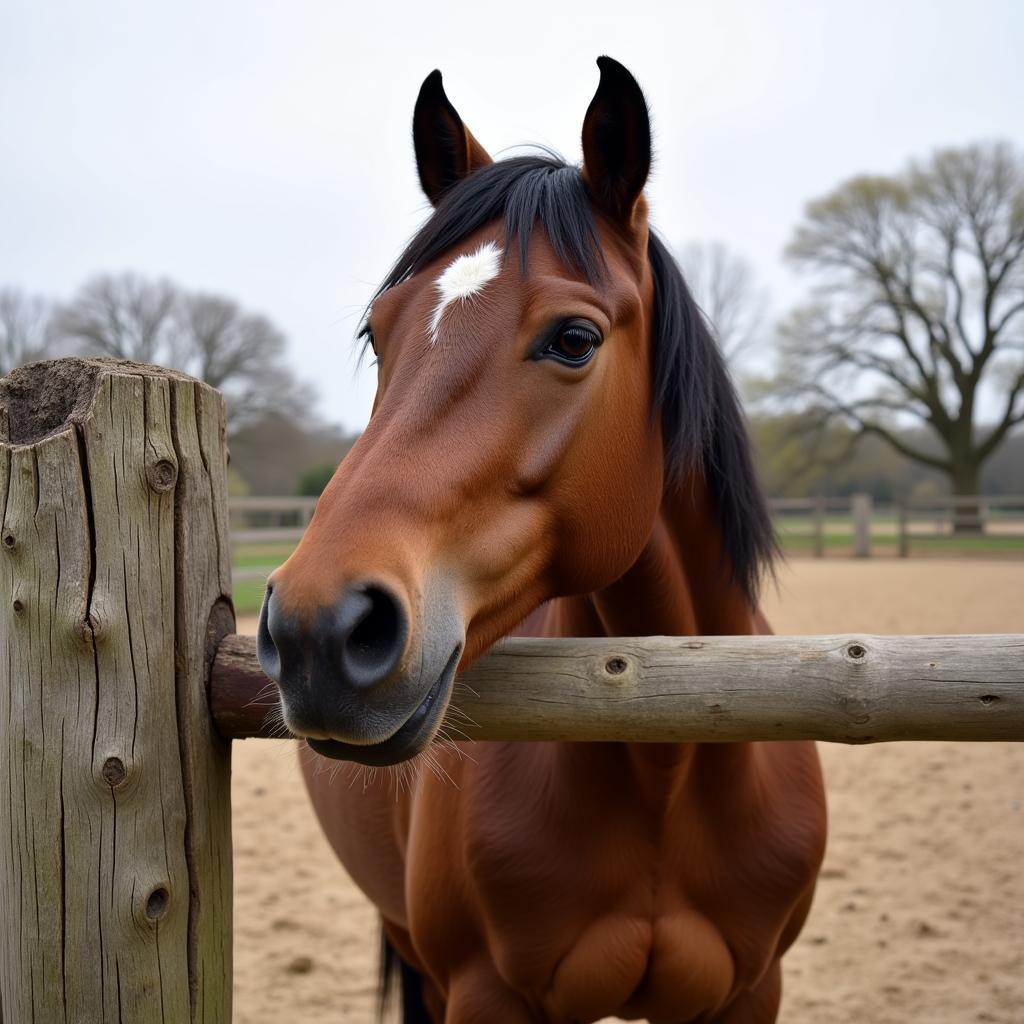Licks For Horses are more than just a cute behavior. They can communicate a wide range of emotions and needs, from contentment to stress. Understanding what different licks mean can help you better care for your equine companion. This article will delve into the fascinating world of horse licks, exploring their various types, interpretations, and how you can respond to them.
Horse licking can be a sign of affection, similar to a dog licking its owner. It can also indicate curiosity, especially if your horse is licking a new object or surface. Sometimes, a horse might lick you simply because you taste salty from sweat! However, excessive licking can sometimes point to underlying health issues or boredom, highlighting the importance of careful observation and understanding.
Finding the perfect gift for the horse lover in your life can be a challenge. Check out our guide on the best gifts for horse lovers for some great ideas.
Decoding the Different Types of Licks
Horses exhibit various types of licking, each with its own potential meaning. Observing the context and accompanying behaviors can help you decipher what your horse is trying to tell you.
The Contentment Lick
A slow, gentle lick, often accompanied by relaxed body language like a lowered head and soft eyes, usually signifies contentment. This type of lick is a positive sign, indicating that your horse feels safe and comfortable in its environment.
The Nervous Lick
Rapid, repetitive licking, especially of objects or surfaces, can be a sign of nervousness or stress. This behavior might be accompanied by other anxious behaviors like pawing the ground or flared nostrils.
The Curiosity Lick
When a horse encounters something new, it might lick it to explore its texture and taste. This is a natural exploratory behavior, driven by curiosity rather than anxiety or contentment.
The Boredom Lick
Horses are intelligent animals and require mental stimulation. Excessive licking, especially of stall walls or fences, can sometimes indicate boredom. Enrichment activities like pasture toys for horses can help alleviate this.
 Horse Licking Fence Due to Boredom
Horse Licking Fence Due to Boredom
Responding to Your Horse’s Licks
Understanding the context of your horse’s licking is key to responding appropriately.
Addressing Nervous Licking
If you suspect your horse is licking due to stress, try to identify and remove the source of anxiety. Providing a calm and predictable environment is crucial. You might also consider consulting a veterinarian or equine behaviorist for professional advice.
Combating Boredom Licking
Providing ample opportunities for socialization, exercise, and mental stimulation is essential to prevent boredom licking. Consider adding pasture toys for horses can provide much needed distractions and prevent these undesirable licking habits. Another option to consider is investing in a horse trailer, allowing them to explore new trails and make new friends with other horses. The Kelly blue book for horse trailers can help you determine your budget when deciding to get a new trailer for your horse.
Encouraging Positive Licking
Positive licking, such as gentle licks directed towards you, can be reinforced with gentle strokes and words of affirmation. This reinforces the bond between you and your horse.
Medical Considerations for Excessive Licking
While licking is often a normal behavior, excessive or unusual licking can sometimes indicate an underlying medical condition. If you notice a sudden change in your horse’s licking habits, consult a veterinarian to rule out any potential health issues.
The Importance of Observation
Careful observation is crucial to understanding your horse’s licking behavior. Paying attention to the context, frequency, and accompanying behaviors can provide valuable insights into your horse’s emotional and physical state.
Are you looking for a new equine companion? Check out our listings of horses for sale athens ga.
Conclusion
Licks for horses are a complex form of communication, offering a window into their inner world. By learning to interpret these subtle signals, you can strengthen your bond with your horse and provide them with the best possible care. Remember, understanding licks for horses is essential for responsible horse ownership. Consider getting some presents for horses to improve their quality of life and demonstrate your love for them.
FAQ
-
Why does my horse lick me? Horses may lick you for various reasons, including affection, curiosity, or because of the salt in your sweat.
-
Is excessive licking a cause for concern? Yes, excessive licking can sometimes indicate boredom, stress, or even an underlying medical condition.
-
How can I stop my horse from licking excessively? Addressing the underlying cause is crucial. This may involve providing more enrichment, reducing stress, or consulting a veterinarian.
-
What does a gentle, slow lick mean? This usually indicates contentment and relaxation.
-
What does rapid, repetitive licking signify? This can be a sign of nervousness or anxiety.
-
My horse is licking the stall walls, what should I do? This could be a sign of boredom. Provide more enrichment and opportunities for socialization and exercise.
-
Should I be concerned if my horse is licking a new object? This is usually normal exploratory behavior driven by curiosity.
If you have any questions about caring for your horse please do not hesitate to contact us. Phone: 0772127271, Email: [email protected] Or visit us at: QGM2+WX2, Vị Trung, Vị Thuỷ, Hậu Giang, Việt Nam. We have a 24/7 customer service team available to assist you.